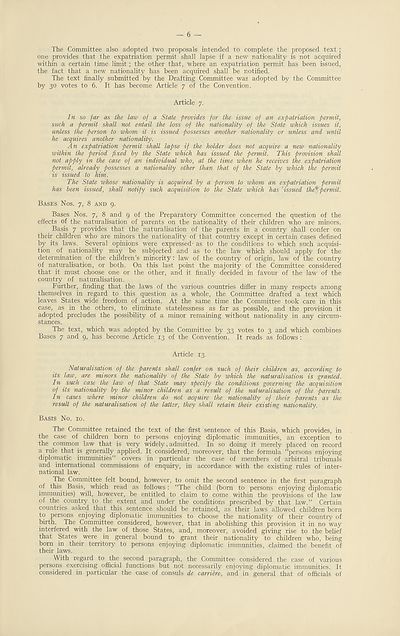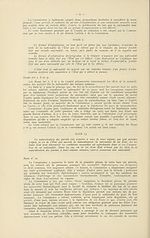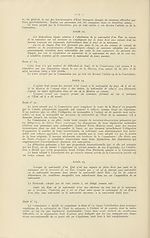Download files
Complete book:
Individual page:
Thumbnail gallery: Grid view | List view

— 6
The Committee also adopted two proposals intended to complete the proposed text ;
one provides that the expatriation permit shall lapse if a new nationality is not acquired
within a certain time limit ; the other that, where an expatriation permit has been issued,
the fact that a new nationality has been acquired shall be notified.
The text finally submitted by the Drafting Committee was adopted by the Committee
by 30 votes to 6. It has become Article 7 of the Convention.
Article 7.
In so jar as the law of a State provides for the issue of an expatriation permit,
such a permit shall not entail the loss of the nationality of the State which issues it,
unless the person to whom it is issued possesses another nationality or unless and until
he acquires another nationality.
An expatriation permit shall lapse if the holder does not acquire a new nationality
within the period fixed by the State which has issued the permit. This provision shall
not apply in the case of an individual who, at the time when he receives the expatriation
permit, already possesses a nationality other than that of the State by which the permit
is issued \to him.
The State whose nationality is acquired by a person to whom an expatriation permit
has been issued, shall notify such acquisition to the State which has 'issued thef\ permit.
Bases Nos. 7, 8 and 9.
Bases Nos. 7, 8 and 9 of the Preparatory Committee concerned the question of the
effects of the naturalisation of parents on the nationality of their children who are minors.
Basis 7 provides that the naturalisation of the parents in a country shall confer on
their children who are minors the nationality of that country except in certain cases defined
by its laws. Several opinions were expressed’ as to the conditions to which such acquisi¬
tion of nationality may be subjected and as to the law which should apply for the
determination of the children’s minority : law of the country of origin, law of the country
of naturalisation, or both. On this last point the majority of the Committee considered
that it must choose one or the other, and it finally decided in favour of the law of the
country ' of naturalisation.
Further, finding that the laws of the various countries differ in many respects among
themselves in regard to this question as a whole, the Committee drafted a text which
leaves States wide freedom of action. At the same time the Committee took care in this
case, as in the others, to eliminate statelessness as far as possible, and the provision it
adopted precludes the possibility of a minor remaining without nationality in any circum¬
stances.
The text, which was adopted by the Committee by 33 votes to 3 and which combines
Bases 7 and 9, has become Article 13 of the Convention. It reads as follows :
Article 13.
Naturalisation of the parents shall confer on such of their children as, according to
its law, are minors the nationality of the State by which the naturalisation is granted.
In such case the law of that State may specify the conditions governing the acquisition
of its nationality by the minor children as a result of the naturalisation of the parents.
In cases where minor children do not acquire the nationality of their parents as the
result of the naturalisation of the latter, they shall retain their existing nationality.
Basis No. 10.
The Committee retained the text of the first sentence of this Basis, which provides, in
the case of children born to persons enjoying diplomatic immunities, an exception to
the common law that is very widely. admitted. In so doing it merely placed on record
a rule that is generally applied. It considered, moreover, that the formula “persons enjoying
diplomatic immunities” covers in particular the case of members of arbitral tribunals
and international commissions of enquiry, in accordance with the existing rules of inter¬
national law.
The Committee felt bound, however, to omit the second sentence in the first paragraph
of this Basis, which read as follows : “The child (born to persons enjoying diplomatic
immunities) will, however, be entitled to claim to come within the provisions of the law
of the country to the extent and under the conditions prescribed by that law.” Certain
countries asked that this sentence should be retained, as their laws allowed children born
to persons enjoying diplomatic immunities to choose the nationality of their country of
birth. The Committee considered, however, that in abolishing this provision it in no way
interfered with the law of those States, and, moreover, avoided giving rise to the belief
that States were in general bound to grant their nationality to children who, being
born in their territory to persons enjoying diplomatic immunities, claimed the benefit of
their laws.
With regard to the second paragraph, the Committee considered the case of various
persons exercising official functions but not necessarily enjoying diplomatic immunities. It
considered in particular the case of consuls de carriere, and in general that of officials of
The Committee also adopted two proposals intended to complete the proposed text ;
one provides that the expatriation permit shall lapse if a new nationality is not acquired
within a certain time limit ; the other that, where an expatriation permit has been issued,
the fact that a new nationality has been acquired shall be notified.
The text finally submitted by the Drafting Committee was adopted by the Committee
by 30 votes to 6. It has become Article 7 of the Convention.
Article 7.
In so jar as the law of a State provides for the issue of an expatriation permit,
such a permit shall not entail the loss of the nationality of the State which issues it,
unless the person to whom it is issued possesses another nationality or unless and until
he acquires another nationality.
An expatriation permit shall lapse if the holder does not acquire a new nationality
within the period fixed by the State which has issued the permit. This provision shall
not apply in the case of an individual who, at the time when he receives the expatriation
permit, already possesses a nationality other than that of the State by which the permit
is issued \to him.
The State whose nationality is acquired by a person to whom an expatriation permit
has been issued, shall notify such acquisition to the State which has 'issued thef\ permit.
Bases Nos. 7, 8 and 9.
Bases Nos. 7, 8 and 9 of the Preparatory Committee concerned the question of the
effects of the naturalisation of parents on the nationality of their children who are minors.
Basis 7 provides that the naturalisation of the parents in a country shall confer on
their children who are minors the nationality of that country except in certain cases defined
by its laws. Several opinions were expressed’ as to the conditions to which such acquisi¬
tion of nationality may be subjected and as to the law which should apply for the
determination of the children’s minority : law of the country of origin, law of the country
of naturalisation, or both. On this last point the majority of the Committee considered
that it must choose one or the other, and it finally decided in favour of the law of the
country ' of naturalisation.
Further, finding that the laws of the various countries differ in many respects among
themselves in regard to this question as a whole, the Committee drafted a text which
leaves States wide freedom of action. At the same time the Committee took care in this
case, as in the others, to eliminate statelessness as far as possible, and the provision it
adopted precludes the possibility of a minor remaining without nationality in any circum¬
stances.
The text, which was adopted by the Committee by 33 votes to 3 and which combines
Bases 7 and 9, has become Article 13 of the Convention. It reads as follows :
Article 13.
Naturalisation of the parents shall confer on such of their children as, according to
its law, are minors the nationality of the State by which the naturalisation is granted.
In such case the law of that State may specify the conditions governing the acquisition
of its nationality by the minor children as a result of the naturalisation of the parents.
In cases where minor children do not acquire the nationality of their parents as the
result of the naturalisation of the latter, they shall retain their existing nationality.
Basis No. 10.
The Committee retained the text of the first sentence of this Basis, which provides, in
the case of children born to persons enjoying diplomatic immunities, an exception to
the common law that is very widely. admitted. In so doing it merely placed on record
a rule that is generally applied. It considered, moreover, that the formula “persons enjoying
diplomatic immunities” covers in particular the case of members of arbitral tribunals
and international commissions of enquiry, in accordance with the existing rules of inter¬
national law.
The Committee felt bound, however, to omit the second sentence in the first paragraph
of this Basis, which read as follows : “The child (born to persons enjoying diplomatic
immunities) will, however, be entitled to claim to come within the provisions of the law
of the country to the extent and under the conditions prescribed by that law.” Certain
countries asked that this sentence should be retained, as their laws allowed children born
to persons enjoying diplomatic immunities to choose the nationality of their country of
birth. The Committee considered, however, that in abolishing this provision it in no way
interfered with the law of those States, and, moreover, avoided giving rise to the belief
that States were in general bound to grant their nationality to children who, being
born in their territory to persons enjoying diplomatic immunities, claimed the benefit of
their laws.
With regard to the second paragraph, the Committee considered the case of various
persons exercising official functions but not necessarily enjoying diplomatic immunities. It
considered in particular the case of consuls de carriere, and in general that of officials of
Set display mode to:
![]() Universal Viewer |
Universal Viewer | ![]() Mirador |
Large image | Transcription
Mirador |
Large image | Transcription
Images and transcriptions on this page, including medium image downloads, may be used under the Creative Commons Attribution 4.0 International Licence unless otherwise stated. ![]()
| League of Nations > Legal > Rapport de la Première commission (Nationalité) > (11) |
|---|
| Permanent URL | https://digital.nls.uk/191514805 |
|---|
| Shelfmark | LN.V |
|---|
| Description | Over 1,200 documents from the non-political organs of the League of Nations that dealt with health, disarmament, economic and financial matters for the duration of the League (1919-1945). Also online are statistical bulletins, essential facts, and an overview of the League by the first Secretary General, Sir Eric Drummond. These items are part of the Official Publications collection at the National Library of Scotland. |
|---|---|
| Additional NLS resources: |
|

